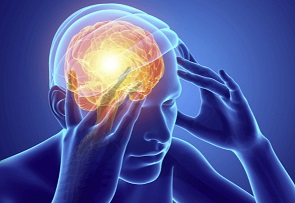BREAKING NEWS! Swiss Study Finds That Individuals With Long COVID Also Have Brain Or Astroglial Injury Even if There Are No Neurological Symptoms!
COVID-19 News - Brain Or Astroglial Injury - Long COVID Jun 29, 2023 1 year, 9 months, 2 weeks, 4 days, 19 hours, 49 minutes ago
Study Uncovers Hidden Brain Injuries in Long COVID Patients!
Medical News: In a groundbreaking study conducted by Swiss researchers, it has been discovered that individuals suffering from Long COVID may experience brain or astroglial injuries, even in the absence of neurological symptoms. This finding sheds new light on the long-term effects of COVID-19 and highlights the importance of understanding the complexities of the disease.

The study, led by Dr Risch Medical Laboratory in Switzerland and conducted in collaboration with several prestigious institutions including the Private University in the Principality of Liechtenstein, the University Hospital of Basel, the University of Bern, the University of St. Gallen, and Kantonsspital Graubünden, aimed to investigate whether biomarkers associated with brain injury were present in individuals with post-acute, mild-to-moderate SARS-CoV-2 infections, as well as in those suffering from Long COVID.
Biomarkers such as serum neurofilament light chain (sNfL) and glial fibrillary acidic protein (sGFAP) were utilized to detect neuro-axonal and astroglial injuries. The study team measured the levels of these biomarkers in 146 individuals from the general population who had experienced a mild-to-moderate SARS-CoV-2 infection. The measurements were taken before, during, and after the infection, at five- and ten-months intervals. Additionally, the participants' symptoms and Long COVID status were assessed through questionnaires.
The study team found that individuals with mild and moderate COVID-19 infections reported neurological symptoms; however, the levels of sNfL and sGFAP did not change significantly and were not associated with symptoms such as headache, fatigue, anosmia, or ageusia.
Surprisingly, in Long COVID patients, there was a significant increase in sGFAP levels, indicating astroglial injury or activation, even in the absence of neurological symptoms.
On the other hand, there was no significant change in sNfL levels in Long COVID patients.
The results suggest that Long COVID may be linked to brain injuries, particularly astroglial damage, which is distinct from the symptoms experienced during the acute or post-acute phases of the infection.
The study provides new insights into the long-term consequences of COVID-19 and highlights the need for further research to understand the underlying mechanisms.
During the ongoing COVID-19 pandemic, numerous cases of neurological complications ranging from mild to severe have been reported. While neurological symptoms are commonly observed during the acute phase of the infection, mounting evidence suggests that these symptoms can persist for months, regardless of the initial severity of the infection. The World Health Organization (WHO) has even recognized this phenomenon as a post-COVID-19 syndrome, commonly referred to as Long COVID.
The researchers utilized advanced technology known as the Ultrasensitive Single Molecular Array (Simoa) Assays to detect cerebrovascular injuries in the blood samples of both acute and post-acute COVID-19 patients with remarkable accuracy. Among the biomarkers
examined, glial fibrillary acidic protein (GFAP) was of particular interest. GFAP is a major protein component found in astrocytes, which are cells responsible for regulating brain function and maintaining the blood-brain barrier. In response to central nervous system injuries, astrocytes undergo changes, leading to increased GFAP levels.
Consequently, elevated GFAP levels in the blood can indicate astroglial damage or activation.
Another biomarker examined was neurofilament (Nf), which is expressed exclusively in neurons and contributes to their structural stability. Neurofilament light chain (NfL) is a component of neurofilaments and is released in response to axonal damage in the central nervous system. Increased levels of NfL can be indicative of neuro-axonal injury.
Previous studies have identified elevated levels of GFAP and NfL in the blood samples of patients with severe SARS-CoV-2 infections requiring hospitalization. However, few studies have investigated brain injury biomarkers in individuals with mild-to-moderate symptoms or after the resolution of the acute phase.
Some studies have reported increased NfL and GFAP levels in non-hospitalized adolescents and adult healthcare workers with mild-to-moderate symptoms. However, the correlation between these biomarkers and neurological symptoms in these groups remains unclear.
The present study aimed to fill this knowledge gap by examining the association between sGFAP, sNfL, neurological symptoms, and Long COVID in patients with mild-to-moderate SARS-CoV-2 infections.
The study team discovered that brain injury biomarkers showed no association with the infection status or neurological symptoms during the acute or post-acute phases of COVID-19.
However, Long COVID patients exhibited increased levels of sGFAP, indicating astroglial injury, despite the absence of neurological symptoms. Intriguingly, sNfL levels did not show a significant change in Long COVID patients, suggesting that the symptoms experienced in Long COVID may have different origins than those during other phases of the disease.
Lead Researcher, Dr Julai Telser, a professor from the Faculty of Medical Sciences, Private University in the Principality of Liechtenstein (UFL), told Thailand
Medical News, “The results of this study challenge previous findings and indicate that Long COVID may be associated with brain injuries.”
However, further research is needed to validate these findings in larger studies and understand the underlying mechanisms fully. The ability to detect brain injury biomarkers in blood samples presents a non-invasive and convenient method for monitoring neurological damage in COVID-19 patients, including those with Long COVID. Implementing these biomarkers in routine clinical practice could greatly enhance patient management and improve our understanding of CNS disorders associated with COVID-19.
In conclusion, the Swiss study provides groundbreaking insights into the long-term effects of COVID-19 on the brain. While individuals with mild-to-moderate COVID-19 infections did not exhibit brain injury biomarkers or significant neurological symptoms, Long COVID patients showed increased levels of sGFAP, indicating astroglial damage. These findings underscore the need for further research and larger studies to understand the full extent of brain injuries associated with Long COVID and improve patient care and management.
The study findings were published in the peer reviewed journal: Diagnostics.
https://www.mdpi.com/2075-4418/13/13/2167
For the latest
Medical News, keep on logging to Thailand
Medical News.
